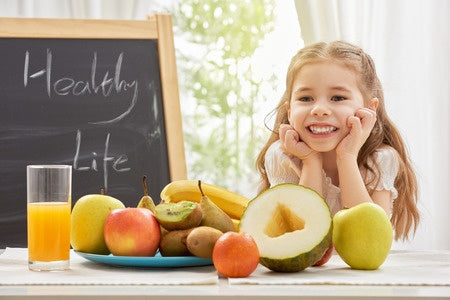Kids love juice. It’s sweet. It’s delicious. And it’s packed with vitamins and nutrients.
Isn’t it?

While traditional juice purchased at the grocery store may seem like a healthy choice based on the fact that it’s all natural and packed with some pretty amazing sounding vitamins, it’s actually not the healthy alternative you might believe it to be.
Sure, it has the upper hand in comparison to soda pops, energy drinks and other manufactured beverages flooding the American market, but when compared to other juices, traditional juice just doesn’t have the same squeeze: Let’s take orange juice as an example.
Consumed by over 70% of the American population, orange juice is the most popular choice of juice among families. But how healthy is it when compared to organic, cold-pressed juices like those produced by Living juice? The short answer is not so healthy, but here’s the long answer and a closer look at why you might want to think twice about reaching for a carton of “fresh” orange juice and reach for a bottle of cold-pressed juice instead.
Re-Defining the World “Fresh”
When you purchase a juice that is labeled and marketed as “farm fresh”, you expect that the juice has been made within the last few days – not the last few months.
According to sources like The Guardian and Fooducate, orange juice purchased at the grocery store can lie around in a refrigerated vat for 6 months or longer prior to being sold. In order to keep the juice “fresh”, it is stripped of oxygen before it is stored, a process that removes a lot of the taste and creates the need for what are now known as flavor packs.
Produced in partnership by juice manufacturers and flavor and fragrance companies, these flavor packs essentially insert flavors and colors back into the juice and are made up of orange essence and oils, says Uncle Matts. Since they are derived from orange by-products, they do not have to be listed as an ingredient on bottles of so-called “fresh” orange juice.
In contrast, when you purchase an organic cold-pressed juice from Living Juice, you know exactly what you, and your kids, are consuming. No hidden flavors. No hidden preservatives. Oh, and by farm-fresh, we mean farm fresh. We’re willing to sacrifice the shorter shelf life for a healthier version of something we know you’ll love. And your kids will love it so much that it won’t be around for that long anyway.
Too Much Sugar, Sugar
In addition to harboring mystery ingredients to boost flavor, traditional orange juice is loaded with fructose sugar, a primary cause of diabetes, high blood pressure and heart disease.
In a recent study, British publication, Mail Online investigated the amount of sugar found in traditional juices and smoothies in comparison to sweets customers forego with the intent of enjoying a “healthier” snack.
When they examined the amount of sugar found in 500ml of 100% orange juice sold in coffee shops around the UK, they discovered that one serving was the equivalent of enjoying 13 Hobnob biscuits, a sugary cookie not unlike those found on the shelves of American grocers. In essence, it would have been healthier to grab a biscuit or two and be done with it.
One of the advantages of choosing an Living organic, cold-pressed juice is the combination of both fruits and vegetables found in our drinks. We insert a dash of sweetness to satisfy your cravings (apple juice, orange juice, lemon juice), and combine them with healthy vegetables like carrots, beets and dark greens that are just as delicious but half as sugary, making our cold-pressed juice both a healthy, and satisfying snack.
There are Healthier Ways to Drink Your Vitamins
As raw food lovers, we know that heating foods to a temperature of more than 42C destroys nutrients and natural enzymes found in certain fruits and vegetables that help with digestion and keep your entire body aligned.
That’s why our organic cold-pressed juices are pressed without the use of added heat or oxygen. Unfortunately, the same can’t always be said for store bought orange juice that, according to Food Republic, is often pasteurized (flash heated) in order to prevent the growth of harmful bacteria during its elongated shelf life.
In addition to avoiding the heat necessitated through pasteurization, the combination of fruits and vegetables found in o2living cold-pressed juice means you’re actually getting more vitamin C than the amount found in traditional orange juice.
According to Modern Health Monk, there is around 50-75mg of vitamin C in one orange, or about 75-90mg per cup of traditional orange juice. The truth however is that vegetables like broccoli (100mg/cup), red bell peppers (190mg/cup) and kale (80 mg/cup), found in our delicious Kids Kale, Apple, Pineapple Cold-pressed Juice, are in fact far better sources of vitamin C, helping to maintain connective tissue, including bones, blood vessels, and skin.

Next time you’re grabbing drinks for your kids’ lunches, weekend outings or after school activities, grab a Living organic, cold-pressed juice and give your kids the healthy advantage they deserve.
